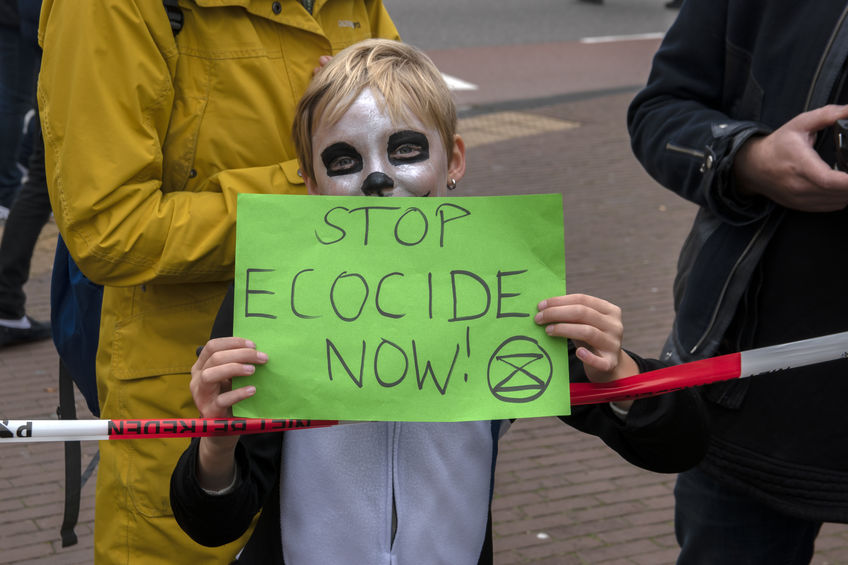Some lawyers have too much time on their hands.
A group of international lawyers is preparing a definition of “ecocide” to be used by the International Criminal Court (ICC). The crime of ecocide would amount to inflicting damage against the environment and destruction of ecosystems. Adding such a crime to the international criminal code would be pointless in many ways, but potentially harmful to certain nations, particularly the United States.
The term “ecocide” suggests a crime of a wartime magnitude where of one country destroys another nation’s air quality, landmass, and waterways. Should the ICC adopt a definition of ecocide, it could rather devolve into a circus to the point of carbon emissions at some level being declared “ecocide” – a crime against the environment and humanity.
The Rome Statute is the legal code that governs the ICC, which presently contains four punishable crimes: genocide, crimes against humanity, war crimes, and aggression. The lawyers group that is pushing ecocide is led by Philippe Sands and Dior Fall Sow, both of whom have extensive experience in international law. They are hoping the eventual definition of ecocide will be added to the code this summer.
The movement to add crimes against the environment and ecosystems has been percolating for decades, going back to the 1972 UN Environment Conference in Stockholm. With increasing hysteria over “catastrophic” climate change and so many elites purporting to believe the planet is on an imminent doomsday path, ecocide may become a new international crime.
International crimes spelled out by the ICC or UN are mostly meaningless beyond the important symbolism represented. Indeed, there should be laws for crimes against humanity. Adding “ecocide” to this international criminal code, however, would trivialize those obvious crimes and be superfluous.
As a practical matter, international law on this scale remains mostly a fiction absent an enforcement mechanism, which usually would follow military conflict. For example, senior Nazi officials were prosecuted for genocide in late 1945 because the U.S., Soviet Union and Great Britain defeated Germany on the battlefield and imposed the trials. Similarly, following the military victory over Imperial Japan, the U.S. prosecuted Japan’s leaders for war crimes (though not the Emperor), which included the slaughter of millions of Chinese and other Asian civilians.
Without a military backdrop, international laws of this magnitude are mere words on paper. Kim Jong Un, the dictator of North Korea, is not fearful of a trial at the ICC for crimes against his own people, including starvation. Xi Jinping of China is not worried about legal accountability for the persecution and killing of Muslim minority populations or for unleashing coronavirus. Xi’s predecessor, Mao Zedong, and Russia’s Josef Stalin (America’s “ally” in WWII) did not lose sleep over violating international law during and after each of them killed millions of their people on a scale larger than Adolf Hitler’s genocidal actions.
Adding ecocide to international law would be more meaningless and beside the point. The worst environmental damage results from war, which also kills many innocent people – a far worse reality than harming the environment. Preventing war spares lives and ecosystems.
The U.S. firebombed cities and civilians in Germany and Japan—and dropped two atomic bombs on Japan—to force unconditional surrender. In addition to many civilian dead, the U.S. caused lots of damage to the environment to spare more of its own soldiers from death and to destroy the enemy’s ability to fight back. Should the U.S. have been “prosecuted” for harming the ecosystems of Nazi Germany and Imperial Japan? How could such an absurdity be implemented?
The fiction of international law and UN treaties continues to the present day. Oppressive dictatorial nations are members of the UN Human Rights Council. Iran is a member of the International Atomic Energy Agency while for years it has violated its prohibition to develop nuclear weapons.
Notwithstanding the fecklessness of international laws and treaties, adding ecocide almost certainly would be exploited against the United States. Other nations, non-governmental organizations and whomever else could charge the U.S. for emitting “too much” carbon dioxide in an attempt to exact “damages,” that is, a massive wealth transfer from the U.S. to other nations.
Doing so against a nation such as heavy carbon-emitting China would be laughed at and ignored by its Politburo. What about the Biden administration? For all of John Kerry’s blathering about Earth having “nine years left,” would this “Special Envoy for Climate” oppose an international court judgment paid by U.S. taxpayers? Would his boss, President Joe Biden, who thought nothing of killing the energy-related jobs of 10,000 Americans with a stroke of his pen?
No sane person wants to see damage inflicted on the environment, but beware of any new international crime against “ecocide.” Like so many other global efforts by international and third world bureaucrats, codifying ecocide more likely is another means to shakedown U.S. taxpayers and cripple our nation’s power and prosperity. Sadly, not a few American politicians and self-loathing Green activists would be accommodative.
